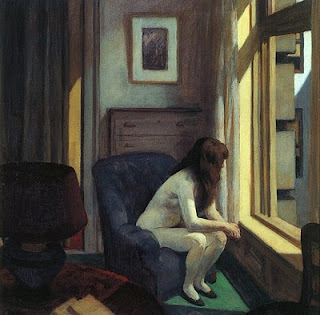“I cut the flowers that grew near the door,
and I arranged them in the center of the floor.
The room was so empty.
There were pale shadows inside.”
-- The Mountain Goats, “Edvard Munch”
You know this already: I want to sing.
You know this already as well: everything is to be found in song.
Here is Ralph Ellison, for instance, in his first published music essay, describing flamenco: “Great space, echoes, rolling slopes, the charging of bulls, and the prancing and galloping of horses flow in this sound much as animal cries, train whistles, and the loneliness of night sound through the blues.”
And so you’ll find the blistering sun in Malian blues and the crooked cobblestone streets in fado and the modest white clapboard churches atop hillsides in bluegrass…
All of which you already know.
So there’s nothing new here, nothing you don’t already know – which is exactly, come to think of it, the way songs work. You know it all already, the song says. But I’ll tell you again anyway, sweet and true. And the singer sings the chorus one more time not to tell you what you don’t yet know but to affirm what you both do.
We’re not talking just any songs, of course, but the right ones, the real ones, the impossibly true. They become more beautiful and delicate, more moving and triumphant (or more desolate, more blue, more inclement or dappled or enticing), the second and then the third and then the fourth time through, each an acquaintance who becomes a friend and then, only over time, with repetition, the beloved, though never an entirely faithful one and certainly not forever: you’re both better off forgetting one another for a while, going your separate ways, crossing paths only every now and again, unexpectedly, at some peculiar time or unlikely place, though it must always be – yes? am I wrong? – precisely the proper season for such a meeting.
Is that accurate, that each song, each right and real and impossibly true one, has its own particular season? Or is it better to say that they conjure their own weather? Is there any sadness that belongs just to summer? Any joy strictly to winter or to fall? Me and Julio Down By the Schoolyard. Mercy Street. Thunder Road. Don’t Fall Apart On Me Tonight. Let It Be Me. Julia. It Had To Be You. Fall on Me. Is there a season, a time under heaven, turning and turning, to each?
Songs are, like poems, private meditations hammered and shaped into public utterance, ardent testimonials of faith or carnal desire, wry manifestos of triumph or defiance, wistful odes to all there is to lose, which is usually – okay, always – youth and love, love and youth, two sides to the same thin rattling coin that again and again finds the hole in your pocket.
The dandy balladeer beneath the balcony window; the cavernous cathedral’s slope-shouldered, arthritic organist; the street-corner crooner in his tattered tuxedo jacket; my teenage son fervently strumming his guitar, belting out Brett Dennen or the Avett Brothers: all of them ask only that most meager of favors: merely to be heard. Why else would one perform, play and sing, sway and strut and bow?
And so the singer loves an audience, every auditorium or stadium seat sold and church pew filled, every inch of dark low-ceilinged clubs lined wall-to-wall and stage-to-bar with piously faithful initiates, thousands and thousands of car radios tuned to the same station, the same infectious tune: Rolling in the Deep, Paparazzi, Love the Way You Lie. Crocodile Rock. California Girls.
But this, too: I’m Gonna Tear Your Playhouse Down. Backstabbers. Guns of Brixton. Surrender. War.
War?
Huh.
What is it good for?
And there’s always a story to the song, isn’t there? In this case, it’s that the original recording of War featured the mighty Temptations, but the song was re-recorded before being released as a single with a new vocal track, this time by Edwin Starr, one of the minor leaguers in Motown’s stable, the change made in order to avoid alienating any Temptations fans who happened, in 1969, to think the goings-on in Vietnam were worth more than what the song insisted they were worth: absolutely nothing.
And what an astonishing conflagration ignites this version: sanctified hymns and swaying choirs and stop-time trumpet blasts alongside a preacher’s Pentecostal shouts and dance-floor gyrations and the relentless call and response, call and response, of white-hot defiance while heartbroken mothers deliver their sons to the undertaker and the war, for all that rabble-rousing, nevertheless rages on.
How many songs tear at the heart and soul like that?
That’s the amazing thing; there’s the miracle: it’s not just a handful or dozens or hundreds but by now, the universe thrumming and thrumming these millions of years, seven billion of us alive on the planet, it's got to be hundreds and hundreds of thousands of songs that do just that: tear at the heart, tear at the soul. Imagine what it’s like – how always, every moment of every hour of every day, someone is listening to a song and, though they’ve heard it dozens and dozens of times before, thinking Here it is, everything I’ve known and felt already. Here it is, and once again it is mine and once again it is new.

























